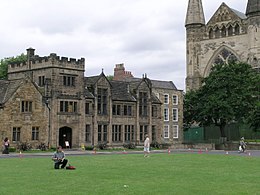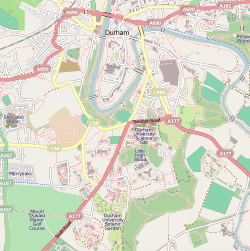Palace Green
| UNESCO World Heritage Site | |
|---|---|
 Pemberton Building, Abbey House (Theology Department) and Cathedral, all facing onto Palace Green | |
| Location | Durham, England, United Kingdom |
| Part of | Durham Castle and Cathedral |
| Criteria | Cultural: (ii), (iv), (vi) |
| Reference | 370bis |
| Inscription | 1986 (10th Session) |
| Extensions | 2008 |
| Coordinates | 54°46′28″N 1°34′33″W / 54.77444°N 1.57583°W |
Palace Green is an area of grass in the centre of Durham, England, flanked by Durham Cathedral and Durham Castle. The Cathedral and Castle together form a UNESCO World Heritage Site.
Although initially not part of the site itself, Palace Green was added to the UNESCO site in 2008.[1][2]
It is situated on top of the narrow, high peninsula formed by a sharp bend in the River Wear. The Cathedral is on the southern side, facing the Castle across the Green on the north side. To the east are Durham University buildings including the law, theology, classics and history departments, with the music department and the university's special collections library to the west.
From the north and east Palace Green is accessed by two cobbled streets called Owengate (formerly Queen's Street) and Dun Cow Lane, the latter taking its name from a local legend involving a milkmaid and her cow. From the west a passageway, 'Windy Gap', leads down to the banks of the River Wear between two buildings which are now part of the university Music School. Early in the twentieth century one of the buildings had been the home of the novelist J. Meade Falkner, author of Moonfleet.
In summer, Palace Green is sometimes used by students of Durham University as a croquet lawn on permission from the groundsman of University College Durham.[3][4]
'Palace Green' is also the name of a hymn tune written by Michael Fleming (1928-2006) while a music student at the university, for the hymn 'Sing Praise to God Who Reigns Above'.[5]
During the COVID-19 Pandemic, marquees on Palace Green were used as a testing centre run by the University.[6] It was also the site of a student encampment for 43 days in May and June 2024 as part of the global pro-Palestinian protests on university campuses that year.[7]
Buildings on Palace Green
[edit]Listed clockwise from south:
- Durham Cathedral – grade I.[8]
- Durham University Department of Music (formerly grammar school) - grade II*.[9]
- Durham University Department of Music library – grade II.[10]
- Palace Green Library (original Durham University library, now houses special collections, exhibitions and a café) – grade II.[11]
- Cosin's Library – grade II*.[12]
- 15th century Exchequer Building (now part of university library) – grade I.[13]
- Durham Castle (home of University College) – grade I.[14][15][16][17]
- University College master's house – grade II.[18]
- Moneyer's Garth (university stone masons yard).
- Bailey Court (University College accommodation).
- Cosin's Hall (Former college, now the university's Institute of Advanced Study) – grade II*.[19]
- Bishop Cosin's Almshouses (until 2020 a café) – grade II.[20][21][22]
- The Pemberton Rooms (the Durham Union Society) – grade II.[23]
- Abbey House, Durham University Department of Theology and Religion – grade II.[24]
References
[edit]- Margot Johnson. "Palace Green" in Durham: Historic and University City and surrounding area. Sixth Edition. Turnstone Ventures. 1992. ISBN 094610509X. Page 4.
- ^ "UNESCO World Heritage Convention - Evaluations of Cultural Properties, pp101" (PDF).
- ^ "Durham's World Heritage Site expands". 20 September 2008. Retrieved 21 December 2008.
- ^ "Things we've actually heard Durham students say this week". Durham University. 11 March 2017. Retrieved 20 May 2021.
- ^ University, Durham. "University College". www.durham.ac.uk. Retrieved 20 May 2021.
- ^ "Michael Fleming". Church Times. 24 February 2006. Retrieved 15 March 2008.
- ^ Sigsworth, Tim. "Covid-19 updates: University's lateral flow tests available to book from tomorrow". Palatinate. Retrieved 20 May 2021.
- ^ Will Dixon; Lily Gershon (20 June 2024). "Pro-Palestinian encampment to "conclude" before graduation after University notice". Palatinate.
- ^ Historic England. "Cathedral Church of Christ and St Mary the Virgin (Grade I) (1161023)". National Heritage List for England. Retrieved 29 January 2023.
- ^ Historic England. "Old Grammar School (University Music Department) (Grade II*) (1160796)". National Heritage List for England. Retrieved 29 January 2023.
- ^ Historic England. "Music Library (Grade II) (1322866)". National Heritage List for England. Retrieved 29 January 2023.
- ^ Historic England. "University Library (Grade II) (1310414)". National Heritage List for England. Retrieved 29 January 2023.
- ^ Historic England. "Cosin's Library (University Library) (Grade II*) (1121382)". National Heritage List for England. Retrieved 29 January 2023.
- ^ Historic England. "Former Exchequer Building, now University Library (Grade I) (1160838)". National Heritage List for England. Retrieved 29 January 2023.
- ^ Historic England. "The Castle West Range (Grade I) (1121383)". National Heritage List for England. Retrieved 29 January 2023.
- ^ Historic England. "The Castle North Range (Grade I) (1160921)". National Heritage List for England. Retrieved 29 January 2023.
- ^ Historic England. "Castle Gatehouse, Entrance Gateway, Side Walls, Linking Walls And Front Wall (Grade I) (1322867)". National Heritage List for England. Retrieved 29 January 2023.
- ^ Historic England. "The Keep (University College) (Grade I) (1322868)". National Heritage List for England. Retrieved 29 January 2023.
- ^ Historic England. "9 Owengate (Grade II) (1160983)". National Heritage List for England. Retrieved 29 January 2023.
- ^ Historic England. "Bishop Cosin's Hall (Grade II*) (1121384)". National Heritage List for England. Retrieved 29 January 2023.
- ^ Historic England. "Former Grammar School (University Police Office) (Grade II) (1310306)". National Heritage List for England. Retrieved 29 January 2023.
- ^ Historic England. "Cosin's Almshouses (Grade II) (1121385)". National Heritage List for England. Retrieved 29 January 2023.
- ^ Historic England. "Former Writing and Plainsong School (Grade II) (1161005)". National Heritage List for England. Retrieved 29 January 2023.
- ^ Historic England. "Pemberton Buildings (Grade II) (1121386)". National Heritage List for England. Retrieved 29 January 2023.
- ^ Historic England. "Abbey House (Department of Theology) Buildings (Grade II) (1121387)". National Heritage List for England. Retrieved 29 January 2023.



